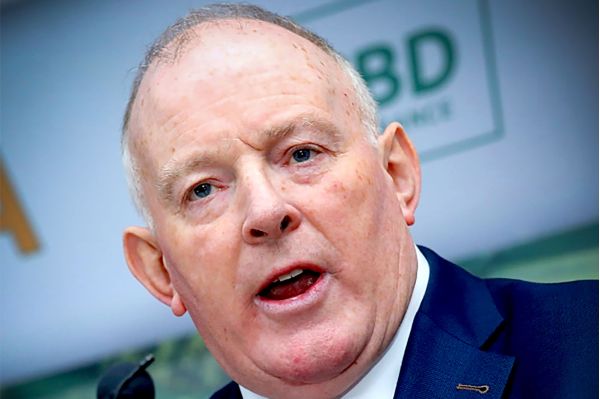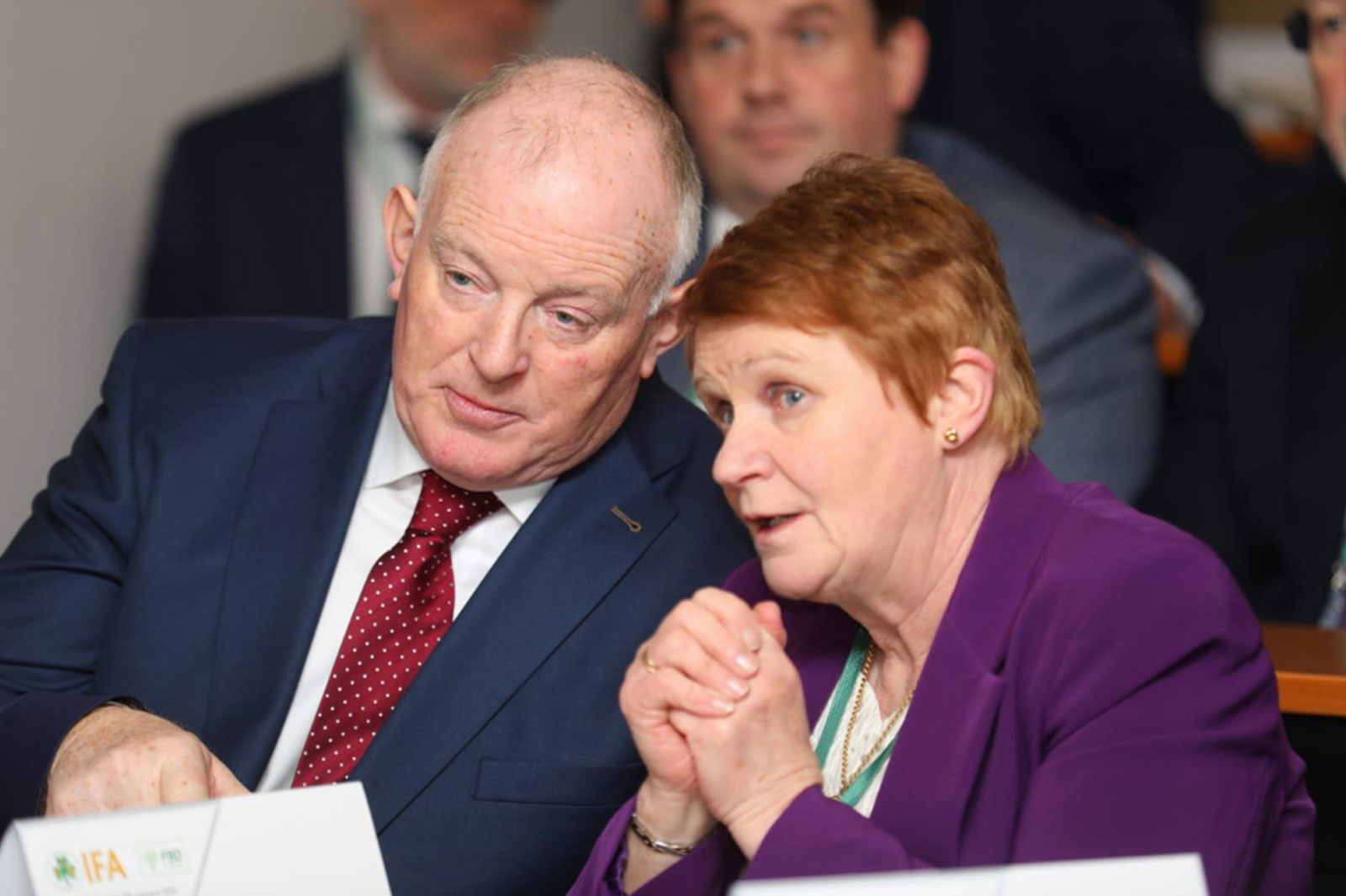Ready for action

“Incomes are always front and centre,” Francie says. He adds: “We have issues around nitrates and the Common Agricultural Policy (CAP) and the cost of doing business, but all that impacts income. If we get those issues right, it should follow on that there will be a positive effect on income.” And it is not just about prices anymore; it’s a multifaceted challenge, he says. “There’s the cost of doing business, regulation, those issues are hugely important as well. For most of us, the markets are playing an ever-increasing role on bottom-line margins. You can’t totally depend on markets the whole time, especially in the vulnerable sectors. That’s why financial supports are so important.”
Land use
Land is a farmer’s most important asset and that needs to be protected, too, he says. “There are so many different calls on land use now. A land-use policy is something we’re going to have to look at because how we use our land to meet climate-change ambitions, is going to impact land availability. Farmers, within reason, must be given the freedom to farm their land in the way they wish. Almost every scheme requires a hectare of land to be part of it. Re-wetting policies, forestry, organics, solar, they are all going to impact on land availability and how we use our land efficiently down the road. This has a huge impact, particularly on more intensive farmers, who are more dependent on the marketplace to give them a margin.”
Seismic change
Francie’s term will coincide with huge changes in agriculture: “The initial discussions on the next CAP have started already, and there’s going to be another look at that all-important Nitrates Directive. CAP is hugely important, but if you were to ask me what’s the most important immediate issue, it has to be the Nitrates Directive, and protecting that 220kg limit at the very least, with the ambition that, if we can get water quality heading in the right direction, there may be a possibility of getting that back up towards the 250kg figure.
“It’s hugely important that we’re together on this in the IFA, and that we have other farm organisations with us. We need everyone working together on this. Processors also must come on board with the farm organisations in a way that they haven’t before. Teagasc will play a hugely important role as well because we need the science to back up our stance. I believe the measures already implemented will deliver over time on water quality.”
This affects everyone, not only dairy farmers, he points out. “Drystock farmers, tillage farmers, young farmers starting off. It affects everyone. It’s going to tighten up land availability in a huge way for everybody.
“On the dairy side, it’s most definitely going to make what is an efficient way of producing milk, an awful lot less efficient. It’s going to put huge pressure on people’s abilities to meet commitments. It’s absolutely imperative that we get our message right on this issue, and we get everybody on board and we protect that derogation.”

President and deputy: Francie Gorman and Alice Doyle pictured at the recent IFA AGM. Photo: IFA.
A bigger CAP?
Does he believe that an enlarged CAP budget is possible to meet food-production and environmental demands? “I don’t believe there is any other choice,” he says. “The European Union is going to reach a tipping point at some stage where they’re going to have to say, are we going to prioritise food production in Europe? Northern Europe has the most sustainable climate in the world for producing food. Generally, we don’t irrigate, certainly in Ireland, to produce most of our food products.
“In contrast, it’s a challenge in developing countries. It’s fuelling migration into Europe. Ireland is a food-producing country and we need to be able to produce as much food as possible. If Europe is to deliver on its environmental ambition the budget must be expanded or risk completely undermining the viability of our agri-food sector. It’s not just at farm level, but further up the chain. Ultimately, if we want to meet environmental targets, it must be financed out of a separate environmental budget.
The same rationale applies to Ireland, he adds: “We have plenty of money to put into the environmental side of the house, and yet when we look for supports for agriculture, it feels like we’re almost robbing people. Our Government needs to get its priorities right and decide if it is going to support agriculture.”
Food regulator
In December 2023, Minister for Agriculture Food and the Marine, Charlie McConalogue formally established the Agri-Food Regulator under the Agricultural and Food Supply Chain Act 2023. The regulator is charged with protecting our agri-food suppliers, in particular, farmers, fishers and small food businesses, from ‘unlawful and unfair trading practices in the agricultural and food-supply chain and will bring greater transparency to the agri-food sector’ according to the minister. Francie shares his thoughts: “People are already wondering whether it is capable or has the powers to produce more fair play for primary producers. When it was set up initially, it looked more designed towards larger-scale horticultural producers that deal directly with the supermarkets. I’m not sure if it has been given enough teeth, but if the CEO and the board have the ambition, they can deliver something.
“You can have all the regulation in the world, but if you don’t have people with ambition, regulation won’t deliver it. Vegetable growers and liquid-milk producers are exiting because of lack of profitability. Supermarkets cry ‘wolf’ but it is the primary producer who takes the real hit time and again. The big retailers’ and meat factories’ accounts should be open to scrutiny by the regulator.
Controversy over beef indexes
November 2023 saw changes introduced to terminal and replacement indexes, which suckler farmers have used as breeding tools since the introduction of the Beef Data and Genomics Programme in 2015. The changes have caused issues, according to Francie.
“We have cows in calf that are going to calve down and produce replacements that will be used in that herd before the end of the scheme that may not meet the four- and five-star criteria. That’s an issue for those closed herds. It’s an issue for pedigree breeders.
“The Irish Cattle Breeding Federation (ICBF) needs to demonstrate the economic advantages of following these revised breeding parameters if we change our practices. Economics must be the first driver, and environmental and social aspects after that are the issues I’d like to see taken into account. It’s got to be re-looked at, because farmers are not happy about the changes. And if you can’t bring farmers with you, you’re not going to get that change.”
VAT rebate unease
The Taoiseach, Leo Varadkar, recently made some off-the-cuff remarks that suggest he’s amenable to compromise on the issue of VAT rebates. Did the IFA president read that into his remarks? “Absolutely. When you have the Taoiseach saying that this is an issue that can be resolved, Revenue needs to go back and ensure that this is resolved. To me, it seems like there’s a different interpretation of a regulation that had been there for many years. People were still getting their refunds on certain types of equipment up to very recently.”
Forward looking
What do the next four years hold for Francie? “I am looking forward to the next four years. I’m looking forward to working with Alice Doyle, our first female deputy president of the IFA. I think we’ll work well together. It’s about bringing everybody together with us within IFA.
“We have a resounding mandate, and a goodwill factor as newly elected representatives. It’s about us harnessing that goodwill factor, bringing people with us. Why wouldn’t I be looking forward to it?”





